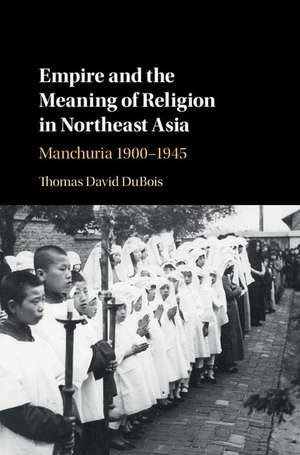Empire and the Meaning of Religion in Northeast Asia: Manchuria 1900–1945
Autor Thomas David DuBoisen Limba Engleză Hardback – 23 dec 2016
Preț: 570.93 lei
Preț vechi: 748.95 lei
-24% Nou
Puncte Express: 856
Preț estimativ în valută:
109.25€ • 112.71$ • 91.17£
109.25€ • 112.71$ • 91.17£
Carte indisponibilă temporar
Doresc să fiu notificat când acest titlu va fi disponibil:
Se trimite...
Preluare comenzi: 021 569.72.76
Specificații
ISBN-13: 9781107166400
ISBN-10: 1107166403
Pagini: 260
Ilustrații: 18 b/w illus. 3 maps
Dimensiuni: 160 x 234 x 18 mm
Greutate: 0.49 kg
Editura: Cambridge University Press
Colecția Cambridge University Press
Locul publicării:New York, United States
ISBN-10: 1107166403
Pagini: 260
Ilustrații: 18 b/w illus. 3 maps
Dimensiuni: 160 x 234 x 18 mm
Greutate: 0.49 kg
Editura: Cambridge University Press
Colecția Cambridge University Press
Locul publicării:New York, United States
Cuprins
Introduction; 1. Foundations of religion in society in Manchuria; 2. From the blood of the martyrs; 3. The mind of empire; 4. Piety in print; 5. The laws of men; 6. A charitable view; 7. Manchukuo's filial sons; 8. May God bless Manchukuo; Conclusion; Appendices; Bibliography.
Recenzii
'Few scholars in the world can match DuBois' knowledge of the modern religious and political histories of China and Japan. In this book he applies that knowledge to Manchuria, a state whose history has already revolutionized global historical thinking about relations between tradition and modernity, the national and the cosmopolitan. An impressive new contribution to scholarship on the politics of religion.' Kiri Paramore, Leiden University, author of Japanese Confucianism: A Cultural History
'In this exhilarating and original study of early twentieth-century Manchuria in global context, Thomas DuBois paints a lively picture of the politics and history of spiritual governance in a time and place that seems far removed from our own - but isn't as far as you might think. From an original and provocative account of the Boxer Uprising, to the politics of knowledge generation in Japanese and East Asian social science circles, to the designation of certain groups as 'religious bandits' in the Japanese owned Shengjing Times, to the politics of religious freedom and Protestant and Catholic mission in Japanese colonial Manchukuo, to the emergence of philanthropy as a civic sphere distinct from religion by groups such as the Daoyuan and the World Red Swastika Society, this book never quits. A fascinating, fun and indispensable read for anyone interested in the shifting and entangled fields of spirituality, sovereignty, empire, nationalism, and law.' Elizabeth Shakman Hurd, Northwestern University
'In this exhilarating and original study of early twentieth-century Manchuria in global context, Thomas DuBois paints a lively picture of the politics and history of spiritual governance in a time and place that seems far removed from our own - but isn't as far as you might think. From an original and provocative account of the Boxer Uprising, to the politics of knowledge generation in Japanese and East Asian social science circles, to the designation of certain groups as 'religious bandits' in the Japanese owned Shengjing Times, to the politics of religious freedom and Protestant and Catholic mission in Japanese colonial Manchukuo, to the emergence of philanthropy as a civic sphere distinct from religion by groups such as the Daoyuan and the World Red Swastika Society, this book never quits. A fascinating, fun and indispensable read for anyone interested in the shifting and entangled fields of spirituality, sovereignty, empire, nationalism, and law.' Elizabeth Shakman Hurd, Northwestern University
Notă biografică
Descriere
This book reveals how religion shaped ideas and propelled the lightning-quick development of Manchuria at the start of the twentieth century.
